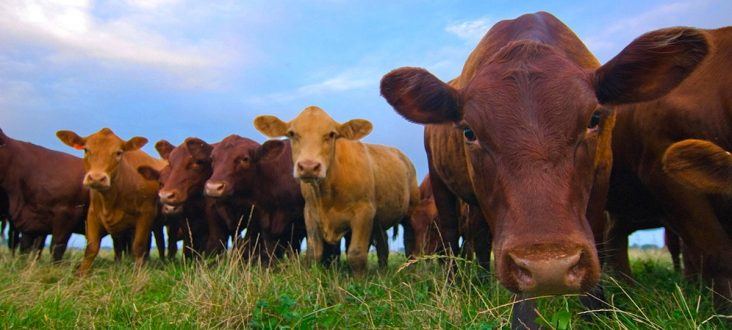Trade, technology are topics to watch for state’s agri sector
by March 22, 2018 12:09 pm 325 views

Earlier this week, Gov. Asa Hutchinson signed a proclamation declaring Tuesday (March 20) as “Agriculture Day in Arkansas.” He met with state employees from the Arkansas Agriculture Department, which encompasses several boards, commissions and divisions, at their west Little Rock headquarters.
With government reorganization on his mind, the governor asked employees for their thoughts on combining and streamlining the agency. Rest assured, he said, agriculture is too important of an industry to not be a cabinet level report.
“It is, it has to be. One, it’s really been the most, one of the most recent reorganizations that we’ve had in terms of its creation,” Hutchinson said. “You know it’s our number one industry in the state. … It has so many different sub-agencies within it and so yes, absolutely the Agriculture Department needs to be a part of that [cabinet].
According to the department, agriculture is a $21 billion industry in Arkansas. The state has more than 43,000 farms across 13.7 million acres. There are also 19.2 million acres of forestland in the Natural State. One out of every six jobs in Arkansas is related to agriculture with agricultural operations in all 75 counties within the state, according to the ag agency.
But farm income has been a challenge in recent years. From 2012 to 2017, farm income declined nearly 49% from its high of $123.8 billion in 2013, according to the federal Bureau of Economic Analysis. U.S. farm income was projected to increase by $1.7 billion, or 3%, to $63.2 billion in 2017, compared to net farm income of $61.8 billion in 2016. In 2014 and 2015, U.S. farm income was $92.6 and $80.7 billion, respectively.
In an interview with Talk Business & Politics’ Roby Brock, Arkansas Agriculture Secretary Wes Ward shared his thoughts on the challenges and opportunities facing the state’s largest economic sector.
Brock: For agriculture, it’s been the best of times, it’s been the worst of times. Overall farm income has really been hit hard for a lot of folks for the last couple of years. Do you think the trade and tariff battles that we’re seeing right now will help boost agriculture in Arkansas or do you think it’s going to tank Arkansas agriculture further?
Ward: It’s a tough question. I do think that as the governor mentioned earlier, Arkansas agriculture is really dependent on our export markets. You look between 30 to 40 percent of our production is exported every year across a broad range of commodities. Any activity on the foreign market that impacts our trading relationships is important. Sometimes, those can be beneficial and sometimes those can go a negative direction.
The concern is always that as the countries are negotiating these tariffs, that agriculture will be the tip of the spear on retaliation. It’s easy for someone to put those retaliatory efforts to effect the agricultural imports that they bring in. That would have certainly a negative impact on Arkansas and Arkansas agriculture, but I do think that the president is negotiating very hard. I think [U.S. Agriculture] Secretary Purdue at USDA, that he’s in his ear about how important agriculture is.
I have to say with the optimistic belief that it’s strong negotiating, that they’re trying to get the best deal and that agriculture at the end of the day will be a prominent player in those negotiations and that hopefully we end up with extended and more market access for our producers.
Brock: When a lot of people think of Arkansas agriculture, they think of the Delta. Rightfully so, there’s a lot of agricultural history and heritage in the eastern part of the state. A lot of people don’t always associate Northwest Arkansas with Arkansas agriculture. What’s your take on how thriving and what Northwest Arkansas brings to the table in terms of agriculture?
Ward: I think it’s kind of surprising that sometimes people have that viewpoint because Northwest Arkansas is the home of Tyson Foods, you’ve got Simmons and all the other poultry companies that are up there in Northwest Arkansas. The poultry industry is extremely important to the state of Arkansas and that’s almost 50% of our cash receipts for agriculture and that’s kind of the hotbed.
Of course, it’s spreading to other parts of the states. You’ve got cattle production in all 75 counties in Arkansas and a strong cattle industry in Northwest Arkansas, so they play a very important role in the agriculture community.
Brock: There’s also a lot of research that goes on through the University of Arkansas and some of the other research institutions across the state of Arkansas. Do you see some things on the horizon that you think could be transformative for agriculture in Arkansas?
Ward: I think we’re always looking and that’s the advent of having those great universities, of having that research capacity, is we’re always looking for ways to improve and ways to do things better. I think there are different production practices and techniques that are out there that we’re trying to figure out better ways of doing things, but we’ll continue to work on those and for the benefit of the industry. We’ll see what they come up with next.
